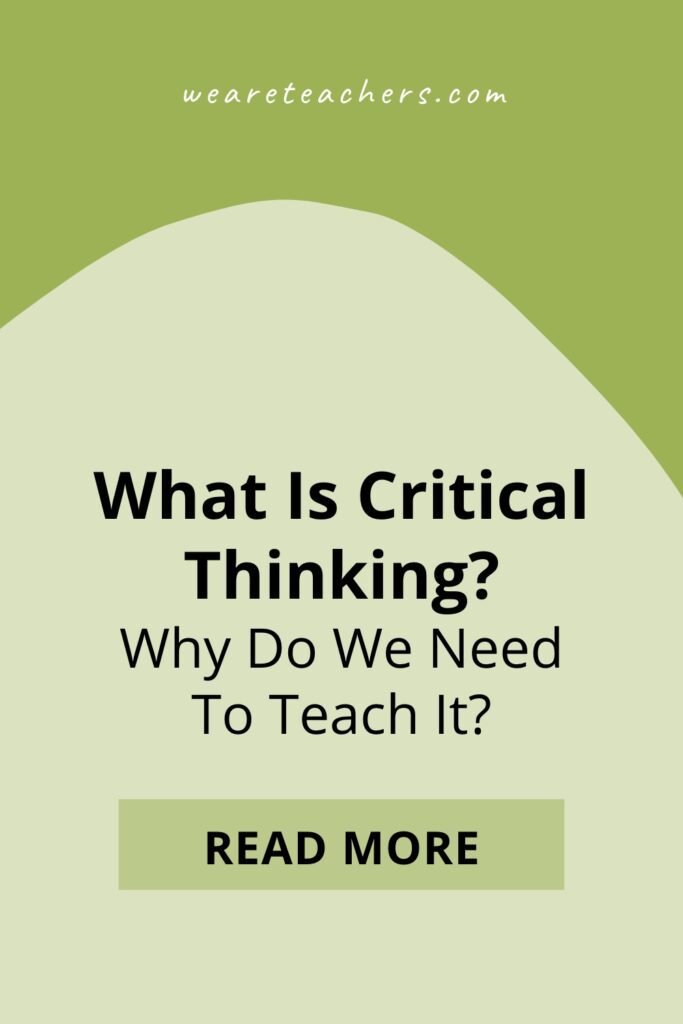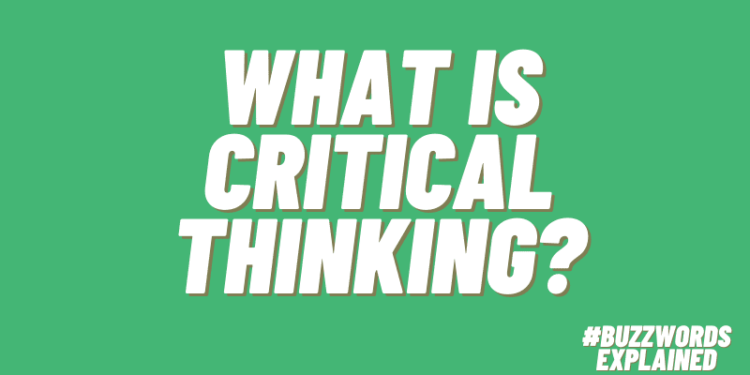The world is full of information (and misinformation) from books, TV, magazines, newspapers, online articles, social media, and more. Everyone has their own opinions, and these opinions are frequently presented as facts. Making informed choices is more important than ever, and that takes strong critical thinking skills. But what exactly is critical thinking? Why should we teach it to our students? Read on to find out.
What is critical thinking?
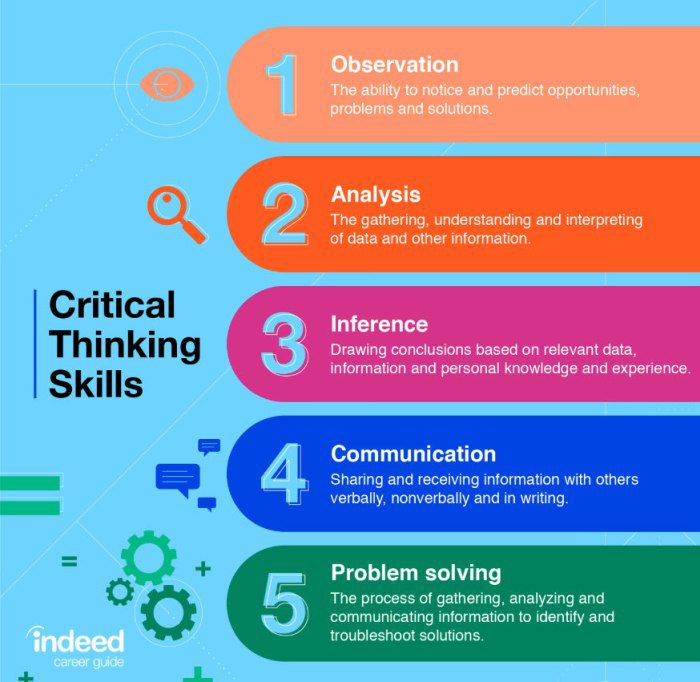
Source: Indeed
Critical thinking is the ability to examine a subject and develop an informed opinion about it. It’s about asking questions, then looking closely at the answers to form conclusions that are backed by provable facts, not just “gut feelings” and opinion. These skills allow us to confidently navigate a world full of persuasive advertisements, opinions presented as facts, and confusing and contradictory information.
The Foundation for Critical Thinking says, “Critical thinking can be seen as having two components: 1) a set of information and belief-generating and processing skills, and 2) the habit, based on intellectual commitment, of using those skills to guide behavior.”
In other words, good critical thinkers know how to analyze and evaluate information, breaking it down to separate fact from opinion. After a thorough analysis, they feel confident forming their own opinions on a subject. And what’s more, critical thinkers use these skills regularly in their daily lives. Rather than jumping to conclusions or being guided by initial reactions, they’ve formed the habit of applying their critical thinking skills to all new information and topics.
Why is critical thinking so important?

Imagine you’re shopping for a new car. It’s a big purchase, so you want to do your research thoroughly. There’s a lot of information out there, and it’s up to you to sort through it all.
- You’ve seen TV commercials for a couple of car models that look really cool and have features you like, such as good gas mileage. Plus, your favorite celebrity drives that car!
- The manufacturer’s website has a lot of information, like cost, MPG, and other details. It also mentions that this car has been ranked “best in its class.”
- Your neighbor down the street used to have this kind of car, but he tells you that he eventually got rid of it because he didn’t think it was comfortable to drive. Plus, he heard that brand of car isn’t as good as it used to be.
- Three independent organizations have done test-drives and published their findings online. They all agree that the car has good gas mileage and a sleek design. But they each have their own concerns or complaints about the car, including one that found it might not be safe in high winds.
So much information! It’s tempting to just go with your gut and buy the car that looks the coolest (or is the cheapest, or says it has the best gas mileage). Ultimately, though, you know you need to slow down and take your time, or you could wind up making a mistake that costs you thousands of dollars. You need to think critically to make an informed choice.
What does critical thinking look like?
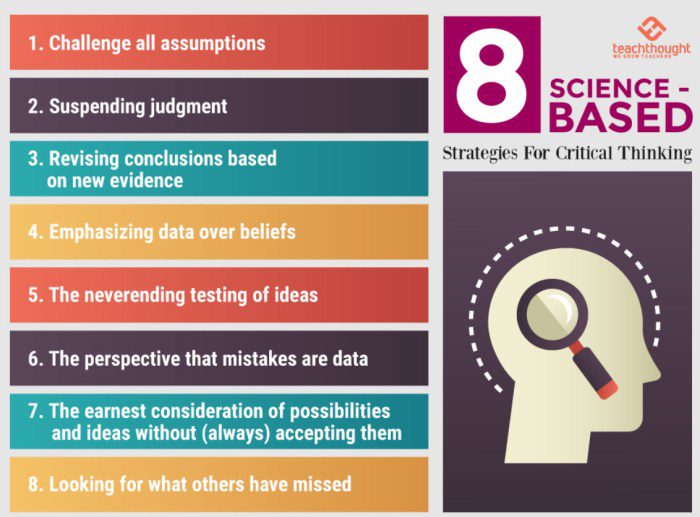
Source: TeachThought
Let’s continue with the car analogy, and apply some critical thinking to the situation.
- Critical thinkers know they can’t trust TV commercials to help them make smart choices, since every single one wants you to think their car is the best option.
- The manufacturer’s website will have some details that are proven facts, but other statements that are hard to prove or clearly just opinions. Which information is factual, and even more important, relevant to your choice?
- A neighbor’s stories are anecdotal, so they may or may not be useful. They’re the opinions and experiences of just one person and might not be representative of a whole. Can you find other people with similar experiences that point to a pattern?
- The independent studies could be trustworthy, although it depends on who conducted them and why. Closer analysis might show that the most positive study was conducted by a company hired by the car manufacturer itself. Who conducted each study, and why?
Did you notice all the questions that started to pop up? That’s what critical thinking is about: asking the right questions, and knowing how to find and evaluate the answers to those questions.
Good critical thinkers do this sort of analysis every day, on all sorts of subjects. They seek out proven facts and trusted sources, weigh the options, and then make a choice and form their own opinions. It’s a process that becomes automatic over time; experienced critical thinkers question everything thoughtfully, with purpose. This helps them feel confident that their informed opinions and choices are the right ones for them.
Key Critical Thinking Skills
There’s no official list, but many people use Bloom’s Taxonomy to help lay out the skills kids should develop as they grow up.
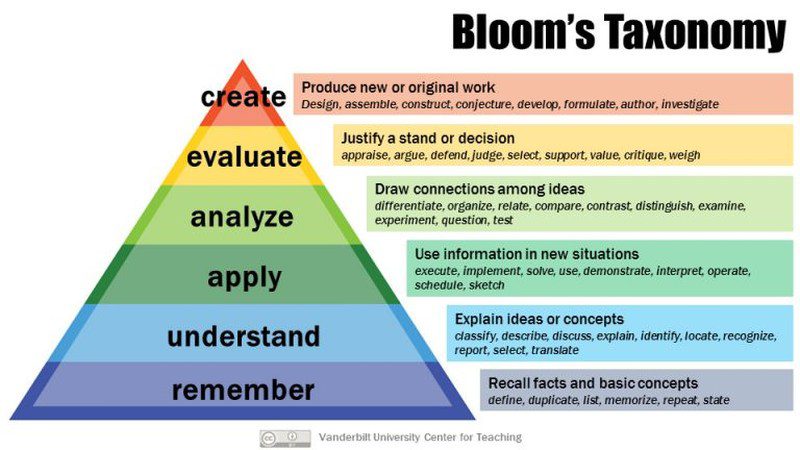
Source: Vanderbilt University
Bloom’s Taxonomy is laid out as a pyramid, with foundational skills at the bottom providing a base for more advanced skills higher up. The lowest phase, “Remember,” doesn’t require much critical thinking. These are skills like memorizing math facts, defining vocabulary words, or knowing the main characters and basic plot points of a story.
Higher skills on Bloom’s list incorporate more critical thinking.
Understand
True understanding is more than memorization or reciting facts. It’s the difference between a child reciting by rote “one times four is four, two times four is eight, three times four is twelve,” versus recognizing that multiplication is the same as adding a number to itself a certain number of times. When you understand a concept, you can explain how it works to someone else.
Apply
When you apply your knowledge, you take a concept you’ve already mastered and apply it to new situations. For instance, a student learning to read doesn’t need to memorize every word. Instead, they use their skills in sounding out letters to tackle each new word as they come across it.
Analyze
When we analyze something, we don’t take it at face value. Analysis requires us to find facts that stand up to inquiry. We put aside personal feelings or beliefs, and instead identify and scrutinize primary sources for information. This is a complex skill, one we hone throughout our entire lives.
Evaluate
Evaluating means reflecting on analyzed information, selecting the most relevant and reliable facts to help us make choices or form opinions. True evaluation requires us to put aside our own biases and accept that there may be other valid points of view, even if we don’t necessarily agree with them.
Finally, critical thinkers are ready to create their own result. They can make a choice, form an opinion, cast a vote, write a thesis, debate a topic, and more. And they can do it with the confidence that comes from approaching the topic critically.
How do you teach critical thinking skills?
The best way to create a future generation of critical thinkers is to encourage them to ask lots of questions. Then, show them how to find the answers by choosing reliable primary sources. Require them to justify their opinions with provable facts, and help them identify bias in themselves and others. Try some of these resources to get started.
More Critical Thinking Resources
The answer to “What is critical thinking?” is a complex one. These resources can help you dig more deeply into the concept and hone your own skills.
Plus, 12 Skills Students Can Work on Now To Help Them in Careers Later.
